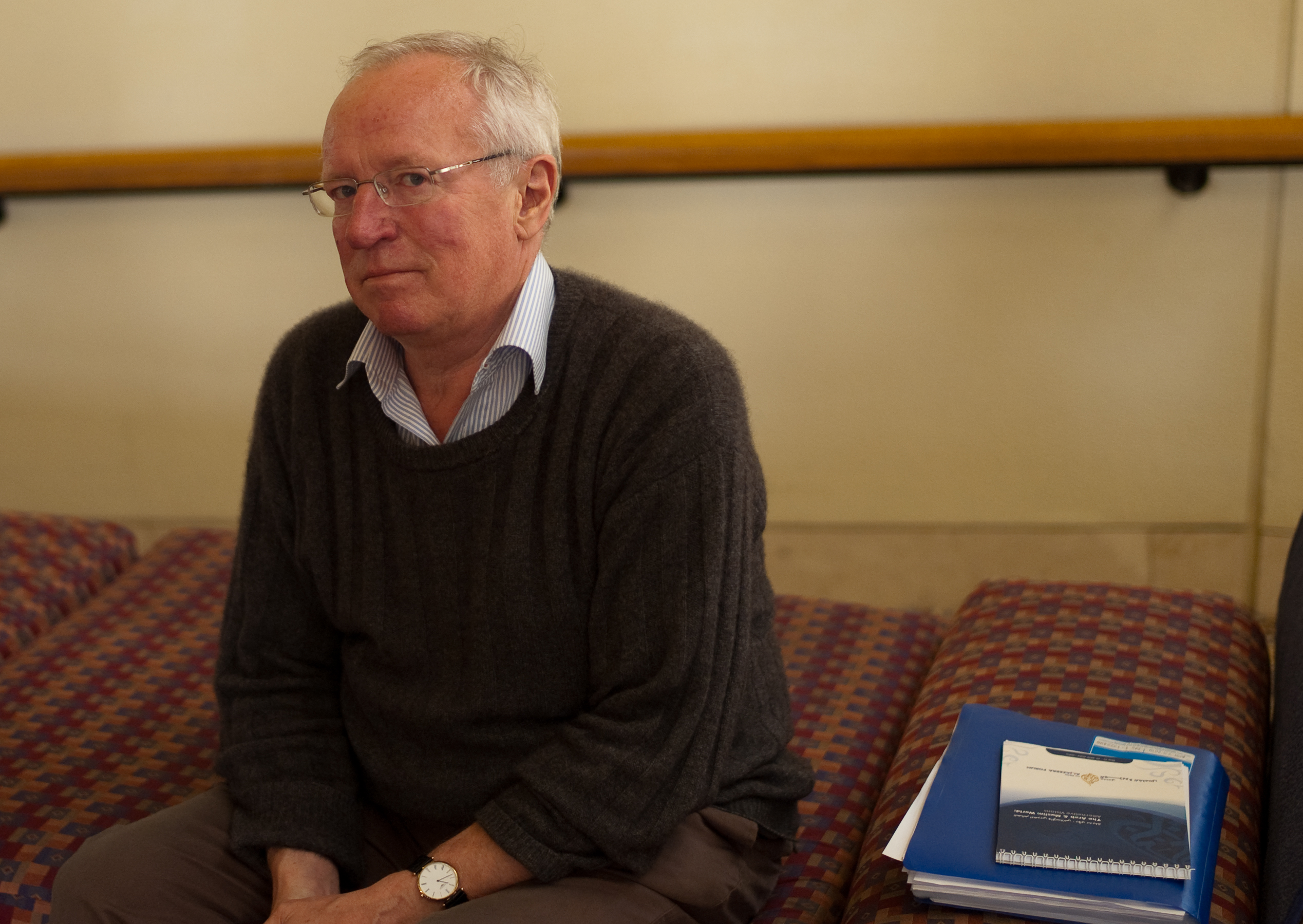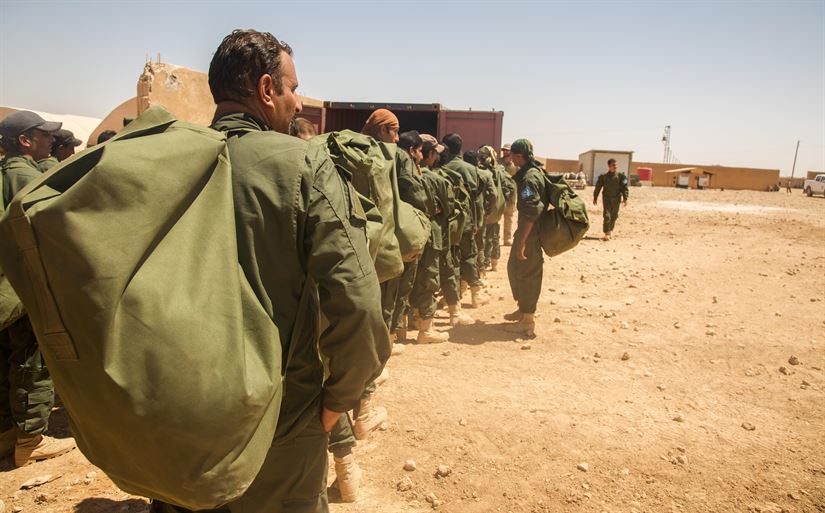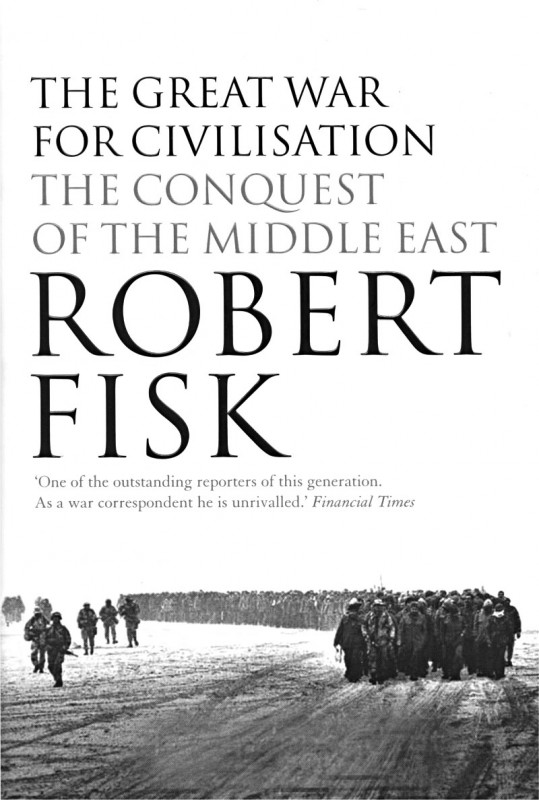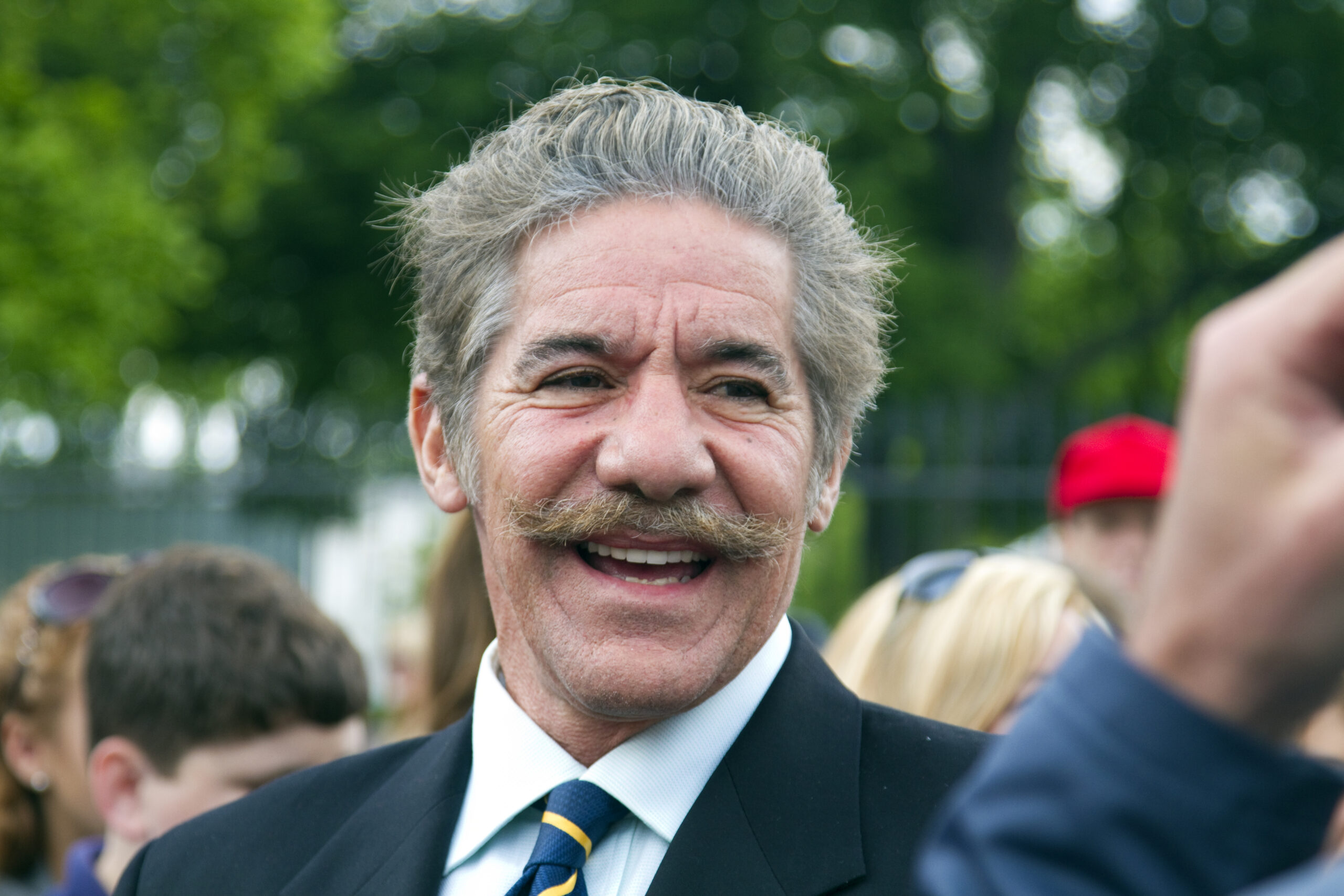Just because Fisk was brave against Israel and opposed Western intervention in the Middle East, it should not stop us from pointing out his incompetence, especially on things Lebanese, writes As’ad AbuKhalil.

Robert Fisk at an Al Jazeera forum in 2010. (Mohamed Nanabhay, CC BY 2.0, Wikimedia Commons)
Consortium News asked As`ad AbuKhalil, our Middle East columnist, to write an assessment of the recently deceased correspondent Robert Fisk. AbuKhalil did not wait until Fisk could no longer respond to criticism, as others have. He started criticizing Fisk’s work in a series of blog posts dating back to 2005.
By As`ad AbuKhalil
Special to Consortium News
 Robert Fisk was, until his death last month, the most famous Western correspondent in the Middle East for many decades. This fact is not so much a testimony to his gifts or qualifications, as it is a reflection of the deterioration of standards for Western reporting from the Middle East and other developing countries.
Robert Fisk was, until his death last month, the most famous Western correspondent in the Middle East for many decades. This fact is not so much a testimony to his gifts or qualifications, as it is a reflection of the deterioration of standards for Western reporting from the Middle East and other developing countries.
Western correspondents in the region used to be actual Middle East experts who had studied its politics and learned its languages (I am talking about people like Peter Mansfield, Patrick Seale, Arnold Hottinger and Eric Rouleau among others). Today, Western newspaper and media correspondents in the region are not even expected to have taken a college course on the Middle East.
Most start their careers covering other beats with no connection to Middle East politics and culture. Sometimes, serving in the U.S. military is considered a plus, as is the case with, say, Dexter Filkins (formerly of The New York Times and currently The New Yorker). Shooting at Arabs may constitute a better qualification than studying their culture.
Fisk acted, and wrote, like old-style Western correspondents in the Middle East but without their qualifications.
He never formally studied the Middle East and never learned its languages. People assumed he knew Arabic but he did not, and when he would invoke Arabic words in his dispatches he often embarrassed himself.
But Fisk, far from conceding his shortcomings and limitations, posed as an academically trained Middle East expert, and would throw in those Arabic words to impress his Western readers. For instance, as I first wrote in February 2012, he once cited the famous Ba`thist slogan “Ummah Arabiyyah Wahidah” (One Arab Nation), but confused the word “mother” with the word “nation.”
Too Close for Comfort

Walid Jumblat. (Lebanese Ministry of Information)
Fisk was too close to the people he was writing about, especially when those people were corrupt despots, tycoons, or war criminals. I wrote about this in December 2005. He was famously close to the Lebanese sectarian warlord, Walid Jumblat, and avoided writing about him critically, regardless of Jumblat’s political oscillations and opportunistic shifts — not to mention his notorious war crimes and human rights violations during the civil war years (and even after).
Jumblat dispatched one of his trusted bodyguards to serve as Fisk’s driver. Those who read Fisk’s dispatches over the years remember the times when Abed, the driver, is quoted as a source: Abed for Fisk was what a cab driver is for Thomas Friedman.
Fisk referred to the late, Lebanese billionaire prime minister, Rafiq Hariri as “my friend” and Hariri offered him a private jet to return to Pakistan from Beirut (Fisk maintains that he turned him down but that did not stop him from praising the “impeccable” dining table of Hariri).
His reporting after Rafiq Hariri’s assassination was indistinguishable from Hariri’s media office releases.
How could Fisk write on Lebanese affairs while admitting close friendships with the two people who are most responsible for Lebanon’s financial and political collapse in the last two decades? How could one trust his judgment on Lebanon, or elsewhere for that matter?
Fisk is not alone; the landscape of Western correspondence in the Middle East is no longer what it was. In the past, there were individual correspondents who did the leg work themselves, and who relied on their own training and knowledge to navigate through the political maze of the region.
Not anymore. The Western correspondent now arrives at an office of a Western newspaper which is already staffed with local stringers, translators, drivers, fixers and bodyguards. The work of most Western correspondents now constitutes the management of emails, watching YouTube (a major source for Western coverage of the Syrian conflict), and communication with local journalists who are politically convenient. (Western correspondents in Beirut, for instance, rely exclusively on people who support Hariri’s March 14 alliance and Syrian rebels).
Did Not Lack Principles

Raqqa Internal Security Forces receive initial issue of equipment after training in Ayn Issa, Syria, July 31 2017. (U.S. Army, Mitchell Ryan)
Fisk’s coverage of Syria changed over time (i.e., sometimes sympathetic to the regime and other times critical of it). Early in the Syrian conflict, Fisk was seen as a champion of the rebels, and in later years, he was attacked as an apologist of the regime.
But it can’t be said that Fisk was a man without principles. He was, to be sure, consistently courageous in defying Western standards on Zionism, and also refused to serve as a cheerleader for Western wars. Unlike most Western correspondents in the Middle East, who never met a U.S. war that they did not justify and glorify, Fisk was critical early on of all Western military adventures in the region.
However Fisk, in December 1993, wrote a glowing profile of Osama bin Laden, failing to see at the time that religious fanatics employed by the U.S.-Saudi-Pakistani axis of reaction were no more than obscurantist terrorists.
Errors of History
Fisk’s writings contain a plethora of errors and mistakes about basic Middle East history. His book, The Great War for Civilization, had many mistakes, as I wrote in 2013: he mistook the birthplace of Jesus (it was in Bethlehem, not Jerusalem); mistook the Arabic word for catastrophe, “Nakbah” — a key term in contemporary Arab political terminology signifying the occupation of Palestine in 1948 — with “nakhbah,” which means “elite.”
 No student of Islam could miss the century — the century and not the year — of the death of Ali, Muhammad’s cousin (Fisk had it in the 8th century), or that Baghdad was an Umayyad city when it was founded after the demise of the Umayyad empire. He even thought that the 1958 revolution in Iraq was Baathist, when that took place five years later. In the Great War, Fisk also erroneously reported that it was Napoleon’s troops who burned Moscow in 1812, rather than the Russians.
No student of Islam could miss the century — the century and not the year — of the death of Ali, Muhammad’s cousin (Fisk had it in the 8th century), or that Baghdad was an Umayyad city when it was founded after the demise of the Umayyad empire. He even thought that the 1958 revolution in Iraq was Baathist, when that took place five years later. In the Great War, Fisk also erroneously reported that it was Napoleon’s troops who burned Moscow in 1812, rather than the Russians.
Fisk once claimed that the AK-47 on Hizbullah’s flag represents the letter “l” in Allah, perhaps thinking that L in English is the same as L in Arabic, although the gun has no letter signification in the flag. In one article, Fisk distinguished between “Sunni Muslim Sidon” and “Shia Muslim Southern Lebanon,” not knowing that Sidon is located in South Lebanon.
Fisk’s lack of knowledge was reflected by the extent to which his reporting seemed to be colored by the last person he spoke to. I wrote in 2005 that “this most critical, cynical, and skeptical reporter has stopped being cynical about the place where cynicism, skepticism, and criticism are most required and most needed if one is to understand the politics of the place, and if one is not to serve as a willing or unwilling propagandist outlet for this or that side.”
Less Than Reliable
The problem with Fisk was not his political biases or even his friendship with corrupt politicians, who he was supposed to be critically covering. The real problem was Fisk’s unreliable reporting.
I first wrote about this in March, 2012:
“…the leading Egyptian blogger Issandr El Amrani noted that ‘if you hang around journalists with several decades of Middle East experience, particularly ones who were in Beirut in the 1980s, you keep hearing these stories again and again about Fisk.’
Indeed you do. ‘It has been common knowledge for years among British and American reporters that Bob can just make things up or lift others’ work without attribution and embellish it,’ writes Jamie Dettmer, another former Middle East correspondent, in his review of [Hugh] Pope’s book [Dining with Al Qaeda]. ‘I recall him doing it to me on a story in Kuwait about the killings of Palestinians at the hands of Kuwaitis following the liberation of the emirate. I remember also the time Fisk filed a datelined Cairo story about a riot there when he was in fact at the time in Cyprus.’ Of course, I have heard such stories for years and this is why I don’t believe Fisk even when he tells the truth.”
He once reported on a supposed conversation in 2010 between then Lebanese Prime Minister Sa`d Hariri and Iranian President Mahmoud Ahmadinejad. Fisk’s story was widely reported by the Lebanese press. But how would Fisk have been privy to that private conversation? It seems he most likely made it up.
He also claimed that the intellectually-challenged and poorly educated, Sa`d Hariri — and I know that first-hand from his professors at Georgetown, where he was admitted thanks to the generous donation of his father — would know the title of Beethoven’s Ninth Symphony. On top of this, Fisk portrayed Hariri (a key ally of pro-U.S. despots) as a champion of freedom.
Not satisfied with reporting about the private conversations of Hariri and Ahmadinejad, Fisk went on in this same piece, to report on details of Ahmadinejad’s conversation with Syrian President Bashshar Al-Asad. This was quintessential Fisk: he was everywhere wherever there was a political event, and he was always — he wanted us to believe — the first to arrive at the scene, even when he filed dispatches from the U.K., with a byline from Beirut (according to reliable sources).
“Fisk — I dare say — flatly lies about Lebanon but not with malice. He mechanically reports all sorts of lies that he receives from his friends in March 14,” I wrote at the time in 2010. “Just because Fisk is brave against Israel and Western Zionists should not stop us from pointing out his utter incompetence and lack of credibility, especially on things Lebanese.”

Geraldo Rivera in 2011. (Mark Taylor, CC BY 2.0, Wikimedia Commons)
Fisk was, in sum, a sensational correspondent who substituted hard work and knowledge for flare, exaggerations, and sometimes, outright fabrication. People forget that Fox News’ Geraldo Rivera was a correspondent in Lebanon in 1978 and 1983 for ABC news, and specialized in glamorizing the pro-Israeli militia of the Lebanese Forces.
Geraldo befriended Bashir Gemayyel, the war criminal, and promoted him as the answer to Lebanon’s problems. In his reporting, Geraldo always inserted himself in the event, or the bombing to appear as an event-maker or first-hand witness and not just a correspondent.
Robert Fisk reminded me of Rivera from those years past. But Fisk was not an aberration in Western reporting of the Middle East.
As`ad AbuKhalil is a Lebanese-American professor of political science at California State University, Stanislaus. He is the author of the Historical Dictionary of Lebanon (1998), Bin Laden, Islam and America’s New War on Terrorism (2002), and The Battle for Saudi Arabia (2004). He tweets as @asadabukhalil
The views expressed are solely those of the author and may or may not reflect those of Consortium News.
Please Contribute to Consortium News
Donate securely with
Click on ‘Return to PayPal’ here.
Or securely by credit card or check by clicking the red button:



Thank you for pointing this out. That practice of reporting falsehoods and outright lies doesn’t concern only the Middle East but even Africa and African countries.This extends too ti the Western analysts who think they know a lot about some of these countries than indigenous ones sometimes misleading others who might otherwise have been informed by those who know better.In the end some Western policies end up being predicated on such views.But,did Mr. Fisk’s reporting manage to teach Westerners a thing or two about their foreign correspondents? Maybe not otherwise we would probably have seen some changes.
As’ad AbuKhalil, thank you for an informative and interesting article. What some commentators seemed to have missed is your fairness toward Fisk, citing both flaws and qualities. As for stenographers posing as journalists today, I was happy to see a little hit on the truly bad reporter, Thomas Friedman. I get nearly physically ill reading the New York Times and Washington Post, and even The New Yorker has bought into the Russiagate and Syria chemical weapons propaganda today.
One line interesting to me, aside from the gist concerning the state of reporting today, was “In the Great War, Fisk also erroneously reported that it was Napoleon’s troops who burned Moscow in 1812, rather than the Russians.” I was recently in Russia and Moscow is all about Napoleon and St. Petersburg is all about the Nazis. If the Russians left the day Napoleon arrived and lit the place up before leaving, one doesn’t hear much about that in the City today.
Again, thank you for revelations on Fisk; I had noticed much that you mentioned myself.
Longtime readers of the now defunct Angry Arab blog are fully aware that As’ad AbuKhalil has long had a seething dislike of Robert Fisk. While AbuKhalil admirably praises Fisk’s principles in the present piece, the majority of the article and AbuKhalil’s numerous previous potshots at Fisk over the years often seem to have a distinctly cherry-picked quality to them.
AbuKhalil’s blog critiques were often lacking a full consideration of facts and nuance, but even so his ire for Fisk often seemed excessive. Perhaps that is why his blog has moved to Twitter, where unfair sniping is widely practiced. While vituperative hits may be satisfying for those who dish them out, they typically cast more heat than light.
One might also note that AbuKhalil’s critiques (including paragraphs 4-6 of this article) are often based on an appeal to credentialism. The idea that those without a relevant degree or other credential satisfactory to AbuKhalil were by definition unqualified. This is a lazy form of criticism that he has resorted to frequently over the years as if it were a slam dunk QED. In reality, it’s simply a variation of dick measuring and it’s bullshit.
Does The Great War for Civilization contain “deplorable” errors? I have no argument with the errors cited. But in a book that’s over 1200 pages long, can anyone be error-free? While the book has its flaws, it deserves praise as a comprehensive overview of the Middle East and surrounding regions. Anyone reading it will on the balance be far more informed than they were before.
Did Fisk get wobbly and less reliable in his old age? It’s more than likely. But on the whole he made many admirable contributions to our understanding of the Middle East.
As’ad’s blog was full of profound knowledge of the history and current state of the region. He is Lebanese and a scholar, so he looked at Fisk’s reporting from an academic and Lebanese viewpoint. As’ad lists at the top of the article several old school Western reporters in the Middle East who had deep education of the region, including speaking the languages, and that is the crux of his piece: to compare Fisk to those reporters whose standards were higher. Credentials like these are not bullshit, but central to As’ad’s critique. I first read Fisk in The Times while living in London in 1979. I then met him at a conference at Columbia University in 2006 and invited him back to UN headquarters to brief UN correspondents at our club. He was exceedingly approachable and friendly and he packed the place. I always admired his reporting though I’d heard stories. A friend who was an editor at The Independent told me the editors always questioned Fisk’s reporting and knew he was at home in Ireland while putting Middle East datelines on his stories. There were too many stories like that. It was a major flaw but does not distract from most of his reporting, nor his courage in criticizing US wars and Israel’s behavior. It is always a mistake to make an icon out of a human being, no mater his or her achievements.
The Great War for Civilization, The Conquest of the Middle East, is a massive tome consisting of 1368 pages. I would be surprised if it did not contain some errors. I have not read the book yet, although I have it in my library, so I have to assume that Mr As’ad AbuKalil is correct about the errors. I note, also, that he is also highly critical in his previous blogs dating from 2005. His criticisms are severe, bordering on savage at times.
On the other hand, I have also read an obituary, by Patrick Cockburn in the British Independent which stated that Robert Fisk wasn’t only a magnificent journalist but a historian of the present who illuminated the world. Cockburn first met Fisk in Belfast in 1972 at the height of the Northern Ireland “Troubles”. He described him then as establishing a reputation as a meticulous and highly informed reporter.
Both reported from Beirut in the mid-1970s and wrote about the Lebanese civil war and the Israeli invasions for different publications but both were reporters for the Independent on the eve of the first Gulf War where Fisk was in Kuwait and Cockburn was in Iraq. They remained friends until his death. During the last fifteen years they talked by phone almost once a week, supplemented with periodic e-mails. Mr Cockburn knew Mr Fisk for almost fifty years.
I will try to respond to some of the criticisms. I did not write anything after Robert Fisk’s death at first. I was urged by my friends to write, and I was hesitant. And even when the editor here broached the subject with me, I was hesitant and said: that I do maintain that Fisk was politically courageous in his career but that his work as a correspondent had the problems that are characteristic of Western reporting on the Middle East. I started my Angry Arab blog in 2003 and I wrote repeatedly on Fisk and you can check that and verify. I never met Fisk and never corresponded with him but people I know shared my criticisms of him with him. There is nothing to apologize about here. You need to follow Lebanese politics closely to know how closely Fisk was tied to the corrupt class of the likes of Hariri and Jumblat. On Palestine Fisk was more courageous than most. I tried to be fair in the assessment but this is my verdict. I also have been criticizing his reporting for years on my twitter and Facebook, both in Arabic and English. The notion that this is the first time I ever criticize him is laughable.
I stopped reading Fisk a few years ago when it became clear from the tone, not to say his arguments, of his articles that he was not exactly providing an impartial perspective, rather one that was, at fundament, ORIENTALIST….
(I had No Idea that he knew not Arabic….how could you dwell in such as Lebanon for decades and understand ordinary [not middle class] people without knowing Arabic???)
I’d rather read Jonathan Cook et al…for a closer and less partial perspective on MENA
So I thank you Prof. As’ad AbuKhalil…Thank you.
Then perhaps you should read J.Cook’s article on the latest attracts on Fisk
it may change your mind again.
As’ad is not a journalist piling on Fisk after he died, which is what Cook’s piece is about.
How dare you insult the memory of Robert Fisk, one of the most outstanding journalists of his generation! I am outraged by this!
All of us have our flaws and there is absolutely nothing wrong with revealing them…and we – in the west (including Fisk) – are NOT minus Orientalism and all too much that colors our perception. And – pray tell – how can someone, anyone, dwell in a country for decades and NOT learn the native language?? Therefore not learn what the working classes think, feel???? French will ONLY, in such instances (Morocco being another example) provide insights into how the bourgeoisie think, perceive things ….
No One – dead or alive – is above criticism…
Western media reports about the war on Syria are pure propaganda. Here is a quick video summary of that:
hXXps://www.youtube.com/watch?v=ours_8ygO0A
This accurate, balanced, unbiased coverage is why I continue to support Consortium News.
Yes, Fisk had his heart in the right place sometimes, but that doesn’t give him a free pass for his reporting. At the same time he was praising Osama bin-Laden (1993), his reporting on the Bosnian war was much too pro-Bosnian Government. That side claimed to represent tolerance and openness, but it was really a Bosnian Muslim nationalist faction led by Alija Izetbegovic (which even made war against the forces of another Bosnian Muslim politician, Fikret Abdic). The biased coverage they received from reporters like Fisk helped prolong the war. Another Consortium News contributor, Diana Johnstone, offered a much more accurate picture in her book Fools Crusade.
I really appreciate the balance and in-depth reporting of Consortium News, as shown in this article.
Just because Fisk seemed to have his heart in the right place, he seemed to have been given a pass by progressive readers, but this article helps to correct that. I know I found his partisan reporting on behalf of the Bosnian Government during the Bosnian War of the 1990’s to be misleading and not accurate. Its interesting that this article points out Fisk was praising Osama bin-Laden at that time.
Robert Fisk did a good deal of fine work. I don’t imagine that puts anyone beyond criticism, but the person of a dead individual journalist is at best an interesting target, whether one has criticized the man in life or not.
Perhaps there is a grander point that AbuKhalil wishes to make, in which case Mr. Fisk might reasonably appear here as a useful example, and perhaps the best example by virtue of being both inadequate and the best Western journalism has recently produced covering the particular area (here I am assuming AbuKhalil’s motive without knowing it, however). There seems to be something of that nature floating around AbuKhalil’s prose, but I am left uncertain on a second reading exactly what point he wishes to make by it. If it is only that one need not take what any journalist writes verbatim, the point is well taken. If the point is that Western journalism regarding the Middle East is generally abysmal, the point is well and enthusiastically taken, and I am glad that AbuKhalil has chosen to take it on. But the concern with Fisk himself muddies what might have been the initial intentions of the proceedings.
For instance, are to concern ourselves, really, to establish whether and when Fisk may have been lying or when misinformed, given the natural difficulties in determining any person’s intent? If so, what am I to take from that regarding the decline of Western journalism in the Middle East or in general? What are we to make of the comparison of Fisk to Geraldo Rivera?
Western culture understands little about other cultures, certainly including those of the Middle East, to the extent that I wonder whether Mr. AbuKhalil really thinks that an American or British university course would help rather than hinder American or British journalists.
There’s a whole profession here to criticize, probably several, and some of the observations here are reasonable. Maybe AbuKhalil would consent to taking out after the living, or possibly even an institution.
Bardamu – “Western culture understand little about other cultures” because it (as a whole) chooses to, because it (western bourgeois culture) presumes itself superior. That presumption for the Middle east- east Asian cultures is known as Orientalism (i.e. racism toward older – much older – civilizations peopled with those of “brownish” skins, therefore surely lesser). Edward Said is a great source for understanding this really existing obscenity.
Fisk had his good moments (definitely with regards to Occupied Palestine [i.e. ALL of it]), but the fact that he did not know/speak/understand Arabic???????????? How can anyone report on any other culture, society if they do NOT know, cannot use, the real language of that culture, society???
Doubtless he spoke French – but that is the colonial language imposed by the French and used by the bourgeoisie. The bourgeoisie will also speak the local variant of Arabic (there are different variants); the lower rungs of Lebanese society (let alone those in other Arab societies) will mainly speak Arabic with a smattering of French…. It behooves anyone who intends to dwell in and understand (especially a journalist) the local population – not only the westernized strata – to learn and comprehend Arabic (not easy at all)…Surely Fisk ought to have????
A remarkably hard assessment of Robert Fisk, but one that T think must be taken seriously because of the many cohesive bits of internal evidence the author offers.
I liked Fisk years ago, but had pretty much stopped reading him because I thought in recent years he was really off his game. A column often offered little that was new or interesting, a sure sign that a reporter is no longer doing the hard work of being investigative.
Perhaps many of us were just impressed by a man living in the region for a long period also reporting on it. I very much did assume he spoke Arabic. We were also grateful to see a Western name in print critical of some of Israel’s many terrible abuses, something avoided by every major Western news source.
I remember the American actor, John Malkovich, seriously saying once that he’d like to kill Fisk (for his reporting on Israel), the kind of ugly incident which spurs one coming to the defense of Fisk.
The region is for most of us a kind of information black hole, owing to the dark interests of the United States, Israel, and the effects so many wars, truth being often called the first victim of war.
But I’m not sure that is much different than is the case for many other places, including very much the United States, where great power is at stake. How little is reported about the forces really driving American society.
Most Americans genuinely believe they have a democracy, rather than what they do have, a plutocracy with window dressing. The great Trump-Biden passion play will leave many Americans grateful democracy survived; a delusional notion that will serve to keep the colossal, corrupt wreck decently covered for a few more years.
Most Americans undoubtedly also believe that the Pentagon bravely defends America, instead of understanding its brutality in enforcing and expanding a global empire to serve the country’s plutocrats.
No, most Americans do not even understand their own society, let alone the societies of the Middle East, where their armies have inflicted immense pain and destruction. If ever there was a case fitting that wonderful line, “ignorant armies clash by night,” it is the Middle East.
The opposite will of course be true for Trump’s crowd about believing American democracy has been saved, but those kinds of deep and fundamental divisions in a society cannot be hidden even by America’s corporate press and vast government apparatus
All too true, Mr Chuckman, all too true. Robert Fisk – in the last few years was hardly contra the western alliance/NATO line when it came to, for instance, that so-called “chemical” attack on Douma….He did not, for example, accept, recognize the real OPCW investigators refutation of the official (i.e NATO) report…
Did Fisk ever renounce his early report on Douma that argued an air-borne chemical attack had not occurred?
Seems to me he repeated his assessment — critical of the U.S./U.K. line — in at least one later report.
You are correct, sir! Americans are truly ignorant of all the world, most sadly their own particular conglomeration of preposterous falsehoods and vicious global atrocities. Presently, however, it appears that they seem to have run out of weak little nations to plunder and are forced to turn inward to their own heartland to grub out a living. Their time is surely at hand.
It would not have been possible to live in Saddam’s Iraq and write critically about Saddam and his government of Iraq. One could write about neighboring countries, and by being close, by knowing people often going there, the reporting might have special value.
I think the same is true of Fisk’s Lebanon. Being there gave him insights, but there were some things he just could not write while living there. That is a comment on powerful men too like Saddam, and the groups they run, not a comment on Fisk’s qualities other than that he was not crazy.
Im still suspicious of you mate. You claim to have been a critic befire his death but where is this material and why is it only coming to light today?
There is a link to the entire page of blog posts at the top of the article in the editor’s note and links to the previous writings over 15 years throughout this article. It could not be any plainer. It may be time to read an eye chart on the wall.
Did Mr. Fisk ever respond to any of the criticisms over the years?
There were widespread stories in the Western media for a long time alleging that Fisk was making his reporting up. Also, take a look at hXXps://www.hindustantimes.com/books/robert-fisk-the-reporter-as-messiah/story-71Z75q4ZiQrJWTxgWHLxRJ.html
and a piece from 2006 by Jonathan Cook at hXXps://mail.islam-radio.net/lebanon/propaganda/Will_Robert_Fisk_tell_us.htm
As’ad has long been critical of Fisk’s reporting, in the same manner as he had described in this article…see his blog and numerous tweets as a start
so now that Frisk is 6 feet under, you can criticize him?
It’s always a good idea to go beyond reading a headline before commenting. The editor’s note at the very top of this article points out: “AbuKhalil did not wait until Fisk could no longer respond to criticism, as others have. He started criticizing Fisk’s work in a series of blog posts dating back to 2005.” And there is a link to all those blog posts for readers to see with their own eyes.